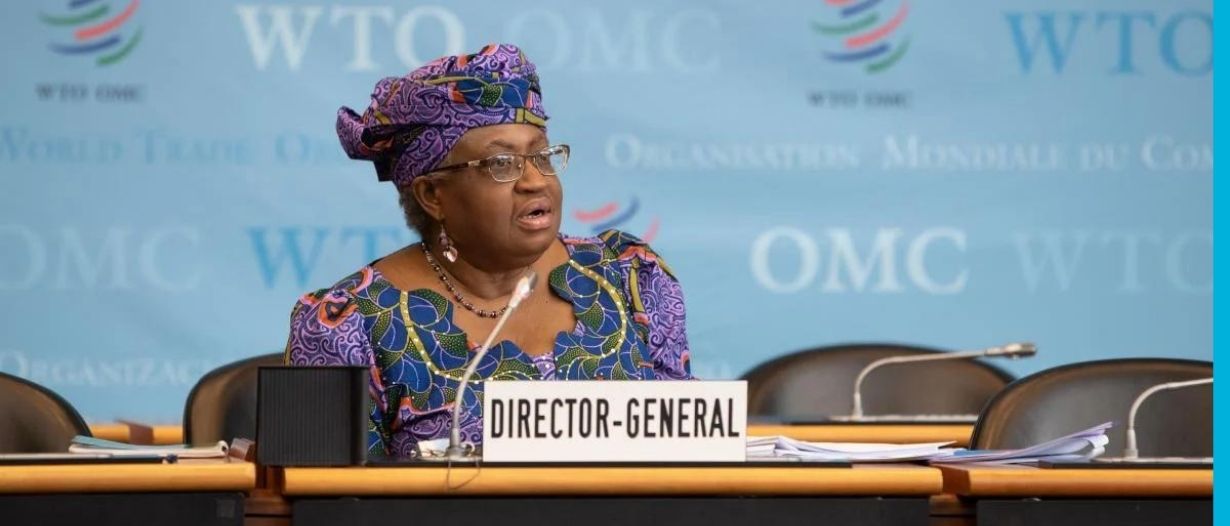Co-authored by Markus Lankford and Christina Onyuta
The World Trade Organization (WTO) is the only global international organisation that deals with the rules of trade between nations. As such, it is entrusted to provide solutions for a range of issues in global trade.
The Ministerial Conference is the highest decision-making body at the WTO. It is a chance for trade ministers and other senior officials from the WTO’s 164 members to discuss the rules of global trade.
This year’s Ministerial Conference, set to take place in Geneva, Switzerland, has been postponed from February 23 to June 13, due to the imposition of travel restrictions following the outbreak of the Omicron variant of COVID-19.
The Ministerial Conference usually takes place every two years, and this year’s conference will be the first since the appointment of Director-General Dr Ngozi Okonjo-Iweala.
However, despite the delays, the WTO has been keen to keep up the momentum of its ongoing trade discussions.
At the 12th Ministerial Conference, the WTO’s top priorities will be:
- Fishing subsidies
- TRIPS waiver
- Environmental Issues
- Food Security
- Reglobalisation
- Dispute Resolution Reform
1. Fishing subsidies
Under a mandate from the 11th Ministerial Conference held in Buenos Aires in 2017, WTO negotiators were given the task of securing an agreement to eliminate subsidies for illegal, unreported, and unregulated fishing.
This task, which aligns with the UN Sustainable Development Goal Target 14.6, also aims to prohibit certain forms of fisheries subsidies that contribute to overcapacity and overfishing.
In doing so, however, the agreement will seek to offer special and differential treatment for developing and least developed countries that rely on their domestic fishing industries.
Over the last few decades, overfishing has become a pressing economic and environmental issue globally.
At present, it is estimated that 34% of global stocks are overfished, compared with 10% in 1974 – in other words, fish stocks are being exploited at too high a pace for their fish populations to replenish themselves.
Declining fish stocks threaten to worsen poverty and endanger coastal communities that rely on fishing for food security and livelihoods.
As the only organisation that can set and enforce global agreements, the WTO has been entrusted with the task of ensuring fishing subsidies do not threaten the sustainability of marine resources.
Harmful fisheries subsidies have helped to create a distorted sea by incentivizing more fishing than the ocean can provide.
— WWF (@WWF) November 28, 2021
????⏰ RT to urge @WTO to #StopFundingOverfishing before it's too late!#MC12 pic.twitter.com/JQYUufZVGr
2. TRIPS waiver
Another “top priority” for the WTO is the global availability and access to COVID-19 vaccines to combat the pandemic.
To meet this goal, South Africa and India have proposed to waive the Trade-Related Aspects of Intellectual Property Rights (TRIPS) Agreement, so that intellectual property rights do not become barriers to universal and affordable access to the development of vaccines worldwide.
The TRIPS Agreement requires member countries to make patents available for any inventions, whether products or processes, in all fields of technology without discrimination, subject to the normal tests of novelty, inventiveness, and industrial applicability.
More than 100 countries have backed the waiver, arguing that it will help save lives by allowing developing countries to produce COVID-19 vaccines at a low cost.
However, the waiver has faced opposition from Europe, the UK, and the US, due to concerns about its impact on pharmaceutical innovation, and this has been enough to block the waiver’s adoption for now.
Many have called for an agreement before the conference due to the urgency of the public health crisis. This topic should see plenty of heat at the conference.
As a consensus-driven organisation, this topic may see a further division between members.
As Russia is invading Ukraine, the Biden Administration is doubling down on giving Russia our healthcare intellectual property through a TRIPS waiver at the WTO.
— Tom Cotton (@TomCottonAR) March 2, 2022
The Administration should be protecting American intellectual property–not giving it to Russia and China.
3: Environmental issues
The WTO is also prioritising issues related to the environment and climate change, including harmonisation of environmental standards.
In December 2021, Ministerial Statements on trade, environment, and sustainable development that were set for the original date of the MC-12 were published.
Although the path of progress of these ministerial statements is unlikely to change at the MC-12 it’s important to note what they are.
Environmental Sustainability Structured Discussions
In November 2020, the Environmental Sustainability Structured Discussions were formed by a ministerial statement on Trade and Environmental Sustainability.
Starting with 50 signatories, by February 2022 it had 71 signatories that included the EU, US, and China.
The ministerial statement in December 2021 described building an environmental trade agenda to operationalise throughout the year and with deliverable results for MC-13.
- Trade-related climate measures and policies
- Promoting and facilitating trade-in environmental goods and services
- promoting sustainable supply chains and addressing challenges and opportunities arising from the use of sustainability standards and related measures, in particular for developing members
- Challenges and opportunities for sustainable trade — capacity building and technical assistance (Aid for Trade)
- Environmental effects and trade impacts of relevant subsidies
Informal Dialogue on Plastics Pollution and Environmental Sustainable Plastics (IDP)
In March 2022, members of the IDP published a work plan, with three workstreams.
- Promote international sharing of data to deal with cross-cutting issues in capacity building and technical assistance
- Promote trade of technology and solutions that reduce plastic pollution
- Best practice for building a circular supply chain for plastics and for reducing plastics use.
Meetings will take place throughout the year, the MC-12 is not imperative for this working group.
Fossil Fuels Subsidies Reform (FFSR)
Starting at the MC11 in 2017, the FFSR was a joint statement to reduce fossil fuels subsidies and support the needs of developing countries affected by phasing out of subsidies.
The joint statement in December 2021 has called for sharing of best practices between WTO members for subsidy and policy reform.
The statement also noted that subsidies for fossil fuels have been increasing over the last decade.
Carbon Pricing Scheme
The Deputy Director-General, Angela Ellard, has said that the WTO holds an important role in carbon pricing schemes and should be on the WTO agenda.
Some 70 carbon pricing schemes already exist which collectively only cover a small percentage of global trade.
Consequently, the WTO is considering supporting a common carbon pricing mechanism for all members and that members can use the WTO as a forum to develop a multilateral approach.
4: Food Security
On the 21st of March, WTO agricultural negotiators met to discuss seven main areas of negotiation in agricultural trade. These areas will be discussed in the lead-up to and after MC-12.
These seven include:
- Agricultural domestic support
- Market access
- Export competition
- Export restrictions
- Cotton
- The special safeguard mechanism]
- Public stockholding for food security purposes
- The cross-cutting issue of transparency.
Ambassador Gloria Abraham Peralta of Costa Rica, the chair of the Agricultural Negotiating Group, said members should prepare for negotiations on the agricultural trading system in light of the Ukraine conflict’s effect on global food markets.
Multiple members of WTO have noted the conflict’s negative impact on food security. They highlighted the possibly disastrous effects of countries’ preemptive export restrictions on food.
Members also voiced support to decide whether the World Food Programmes (WFP), a United Nations food-assistance branch, purchasing programme should be waived from export restrictions for food purchasing.
Public stockholding programmes for food security purposes (PSH) will be discussed at this year’s conference.
Developing country members have noted issues related to purchasing food at the prices administered in programmes. This is pertinent for food-importing developing members who will face issues with increases in prices and physical supply-chain disruption.
Agriculture reform can contribute strongly to environmental sustainability.
— George Mina (@AusWTO) March 23, 2022
An important message from ????????’s Special Representative for Agriculture at this week’s meeting of the #CairnsGroup ???? @wto
Read more ????????https://t.co/S77vxuPLSK pic.twitter.com/swzDGWGT3w
5: Reglobalisation
In March 2022, Dr Okonjo-Iweala spoke at the WTO Global Supply Chain forum talking to attendees about the need for “reglobalisation”.
The Director-General has said that “Deeper, more diversified international markets remain our best bet for supply chain resilience”.
Members of the WTO such as China, the US and the EU have been looking to onshore supply chains of electric vehicles in an attempt to build and save jobs for their domestic economies.
Look for the WTO pushing back against countries’ attempts to onshore supply chains.
6: Dispute Resolution Reform
The WTO is looking to reform its dispute settlement system, to reach a common understanding of how WTO disputes should be addressed.
Since 1995, 610 disputes have been taken to the WTO with 350 rulings being issued.
All WTO members agree that the organisation needs reform, but historically, a lack of trust among members has led to disagreements on the nature of the reforms and their order of priority.
The Deputy Director-General, Angela Ellard, has suggested that a common understanding is unlikely to be reached at eh MC-12. However, Ellard notes that members’ use of negotiation and facilitators in dealing with disputes is a positive development in members reaching a common understanding.




























